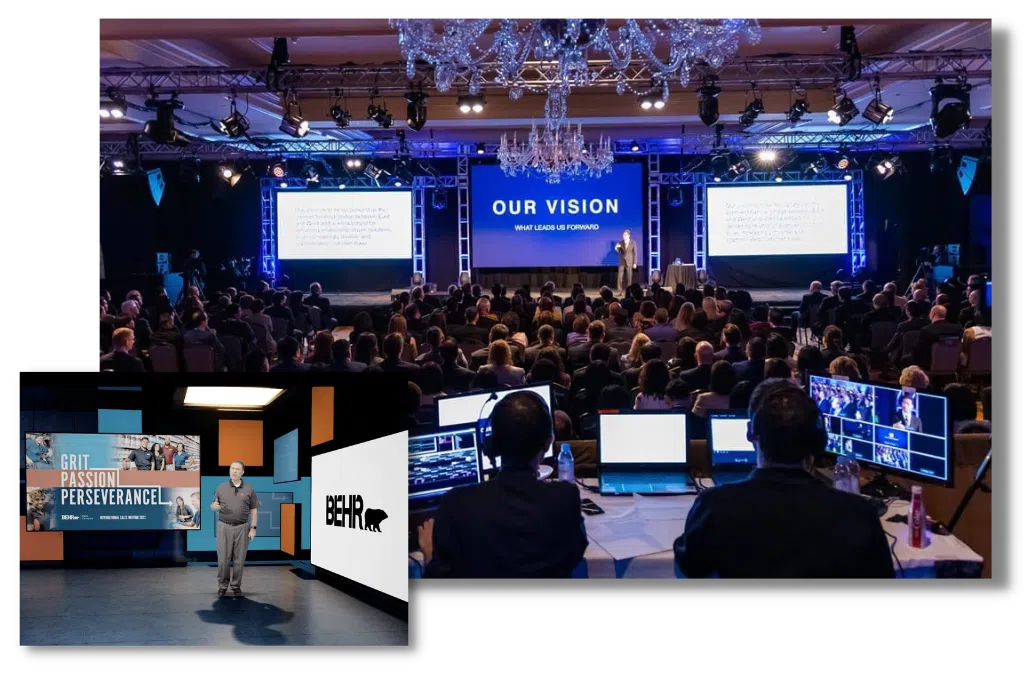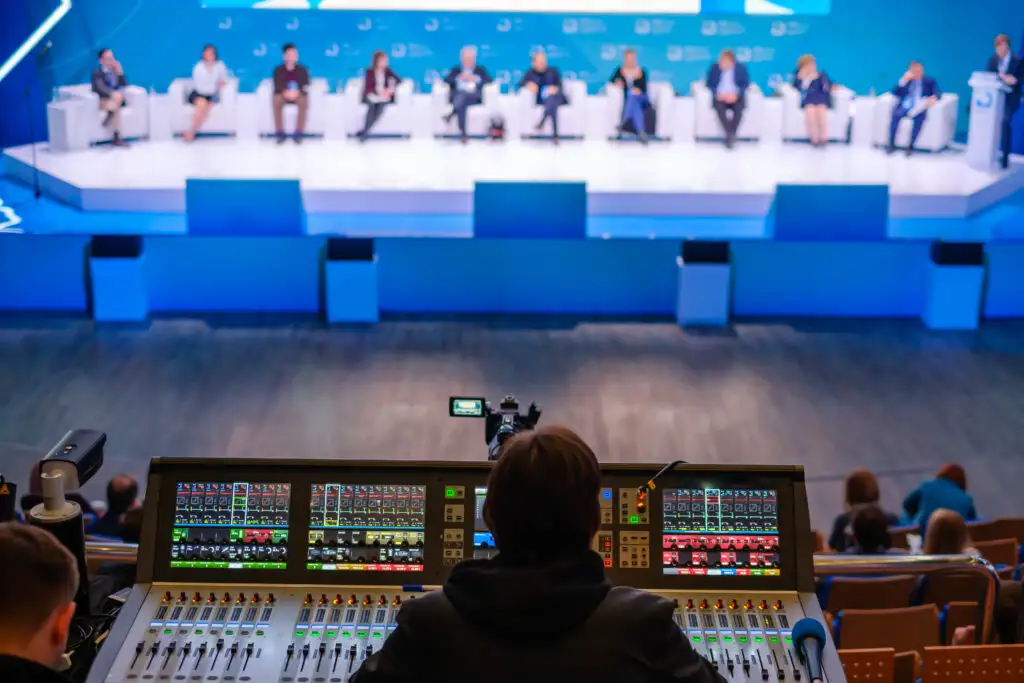Comprehending the Basics of Event Production
The ins and outs of event production require a thorough understanding of numerous fundamental aspects, including the facility of clear purposes, careful budgeting, and tactical venue selection. As we discover these essential aspects, one need to think about how they relate and influence the general success of an event.
Defining Event Goals
Defining event objectives is a crucial action in the event manufacturing procedure, acting as the foundation upon which all planning and implementation are constructed. Clear goals supply direction, guaranteeing that all stakeholders comprehend the event's objective and preferred results. These objectives need to be specific, quantifiable, possible, appropriate, and time-bound (WISE), which enables for efficient assessment of success post-event.
Identifying the target audience is vital in forming the goals. Understanding their rate of interests, assumptions, and demographics allows event organizers to tailor content and experiences that reverberate with attendees. In addition, aligning the purposes with broader business goals promotes assistance from management and stakeholders, guaranteeing that the occasion adds to the total mission.
Interaction and communication are important parts to take into consideration when defining goals, as they dramatically impact guest satisfaction. Finally, it is essential to communicate these goals clearly to all employee associated with the planning procedure. This quality boosts collaboration, focusing efforts on accomplishing a linked vision. By developing distinct purposes, occasion manufacturers can create a structured structure that overviews decision-making and source allotment, eventually resulting in an effective event.
Budgeting for Success
Reliable budgeting is essential for the effective manufacturing of any type of event, as it gives an economic framework that supports all intending activities. A well-structured budget permits occasion planners to allocate sources effectively, guaranteeing that every aspect of the occasion is effectively funded while minimizing the threat of overspending.
To produce an effective spending plan, begin by identifying all prospective expenses, such as place expenses, catering, amusement, devices rentals, and advertising and marketing. It is important to categorize these costs into taken care of and variable costs, which helps in understanding which elements are non-negotiable and which can be changed based on monetary restraints.
Furthermore, revenue resources should be determined early in the budgeting procedure. This includes ticket sales, sponsorships, and product sales. By approximating prospective revenue, planners can straighten their expenditures appropriately, making certain that the event stays monetarily practical.
Regular tracking of the spending plan throughout the preparation process is important. This permits for adjustments to be made as essential, maintaining financial technique. Inevitably, an efficient spending plan not just safeguards against unanticipated prices however additionally boosts the general high quality and experience of the occasion, ensuring its success.
Venue Selection Strategies
Choosing the ideal venue is an essential component of successful occasion production, as it establishes the phase for the overall experience. The initial step in location option is to specify the event's objectives and audience, which will certainly direct the selection of area and capacity. Factors to consider such as accessibility, setting, and offered amenities need to line up with the occasion's motif and purpose.
Next, review the venue's capacity to fit your anticipated variety of attendees while ensuring convenience and involvement. It is necessary to see possible places in person to evaluate their layout, centers, and overall allure. Furthermore, assess logistical elements consisting of parking schedule, public transportation access, and any type of restrictions that might influence the occasion.
Budget plan constraints are additionally vital; guarantee that the venue fits within economic specifications while offering essential services. Agreement negotiations need to be approached with diligence, looking for transparency pertaining to extra prices, cancellation policies, and responsibility protection.
Last but not least, think about the place's track record and previous performance for comparable occasions (Audio Visual Services). Engaging with previous customers can provide useful insights into the place's reliability and service top quality, ultimately helping in making Visit Website an educated decision

Technical Manufacturing Elements
Technical manufacturing components function as the backbone of any kind of occasion, guaranteeing that all sound, visual, and lights elements work harmoniously to develop an immersive experience. These aspects incorporate a range of technologies and methods aimed at supplying content properly and engagingly.
Audio systems are crucial, entailing microphones, speakers, and mixing tools to make sure clear sound shipment. High-quality audio is crucial for preserving target market engagement, specifically in larger locations. Visual elements include forecast systems, LED displays, and video feeds, which boost the visual story of the event and sustain the total theme.
Illumination plays a pivotal function in assisting and establishing the state of mind audience focus. A properly designed lights plan incorporates different strategies, such as limelights, ambient lighting, and shade washes, to create dynamic ambiences appropriate for different sections of the occasion.
In addition, technological production elements need careful preparation and assimilation. This consists of pre-event sound checks, video wedding rehearsals, and illumination examinations to resolve possible challenges before the event starts. Ultimately, a cohesive technical production strategy not just boosts the occasion experience yet additionally shows the expertise and focus to information that participants expect.

Group Coordination and Roles
Successful event production pivots on smooth group control and plainly specified roles among all participants. For an event to run smoothly, each employee should comprehend their obligations and exactly how they add to the total vision. This starts with developing a thorough business framework that marks duties such as occasion supervisor, logistics planner, technological supervisor, and marketing professional. Each function carries particular obligations that have to be executed along with each other.
Reliable communication is vital in this collaborative environment. Audio Visual Services. Regular meetings and updates guarantee all staff member are lined up and can adapt to any kind of adjustments or difficulties that arise. Making use of job management devices can facilitate this communication, permitting real-time updates and task monitoring
In addition, promoting a society of team effort is vital. Encouraging cooperation among varied ability not just enhances analytic but additionally promotes a favorable working ambience. When team participants feel valued and encouraged, their efficiency rises, eventually resulting in an read this post here extra successful occasion.
Final Thought
To conclude, a detailed understanding of event production includes specifying clear goals, establishing a robust spending plan, choosing an appropriate location, managing technical manufacturing elements, and making certain efficient group coordination. Each part plays a vital duty in the check overall success of an event. By diligently dealing with these principles, event coordinators can boost the attendee experience, enhance sources, and achieve preferred end results, thereby contributing to the occasion's total effectiveness and effect within the designated target market.
The intricacies of event production need a detailed understanding of numerous foundational aspects, consisting of the facility of clear purposes, precise budgeting, and calculated venue selection.Defining event goals is an important action in the event production process, offering as the structure upon which all preparation and implementation are built. By establishing distinct purposes, occasion producers can produce a structured framework that guides decision-making and resource allotment, eventually leading to an effective occasion.
In verdict, a thorough understanding of event production encompasses specifying clear purposes, establishing a durable budget, selecting an appropriate venue, managing technical production elements, and ensuring effective group coordination. By carefully dealing with these basics, event planners can enhance the attendee experience, optimize sources, and attain preferred results, thus contributing to the event's overall performance and effect within the intended target market.